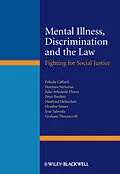This book describes clearly how legislation can be used to advance the rights and entitlements of people with mental health problems. Straightforward and practical, it provides useful information on how to address disabilities so these people may enjoy full citizenship. It presents the key issues succinctly and illustrates these with legislative examples from around the world. This book documents the role that law can play, at all levels, in combating such discrimination and abuse.
Autorentext
Felicity Callard is the author of Mental Illness, Discrimination and the Law: Fighting for Social Justice, published by Wiley.
Norman Sartorius is a Croatian psychiatrist and university professor. Sartorius is a former director of the World Health Organization's Division of Mental Health, and a former president of the World Psychiatric Association and of the European Psychiatric Association.
Julio Arboleda-Flórez is the author of Mental Illness, Discrimination and the Law: Fighting for Social Justice, published by Wiley.
Peter Bartlett is the author of Mental Illness, Discrimination and the Law: Fighting for Social Justice, published by Wiley.
Hanfried Helmchen is the author of Mental Illness, Discrimination and the Law: Fighting for Social Justice, published by Wiley.
Heather Stuart is the author of Mental Illness, Discrimination and the Law: Fighting for Social Justice, published by Wiley.
José Taborda is the author of Mental Illness, Discrimination and the Law: Fighting for Social Justice, published by Wiley.
Graham Thornicroft, Health Service and Population Research Department, Institute of Psychiatry, King's College London, UK.
Inhalt
Acknowledgements, ix
Glossary, xiii
1 Introduction, 1
1.1 Using the law in the fight for social justice, 1
1.2 Whom are we addressing?, 5
1.3 The history of this book, 7
1.4 How the book has been organised, 12
1.5 Terms used to describe mental health problems, 14
1.6 Our authorial voice(s), 16
References, 17
2 Principles and Concepts, 19
2.1 The tension between advancing the rights of people with mental health problems and attitudes in society, 20
2.2 Law relating to people with mental health problems: the historical context, 21
2.3 Discrimination, 24
2.4 General versus specific law, 36
2.5 Importance of enforcement, 39
2.6 Social model of disability, 41
2.7 Capacity and competence, 44
2.8 Human rights, 47
2.9 Stigma, discrimination and 'structural violence', 52
2.10 Social justice, 54
2.11 What comes next?, 57
References, 57
3 Civil and Political Participation, 63
3.1 Voting, 63
3.2 Jury service, 65
3.3 Measures intended to optimise civil and political participation, 66
References, 69
4 Legal Capacity, Decision-making, Discriminatory Statutes and Practice, 71
4.1 Guardianship and the legal right to make decisions, 71
4.2 Discriminatory statutes and practice, 76
References, 78
5 Work and the Workplace, 79
5.1 Mental health problems and labour force participation, 79
5.2 Intellectual disabilities and labour force participation, 81
5.3 Employment disability legislation, 82
References, 86
6 Education, 89
6.1 United Nations Covenants and examples of country-based legislation, 90
References, 95
7 Housing, 99
7.1 Discrimination in housing, 99
7.2 Examples of legislation, 100
7.3 Community living, 103
References, 106
8 Social Security and Social Protection, 109
8.1 What are social security and social protection?, 109
8.2 Social security and social protection for people with mental health problems, 110
8.3 Elements of social protection/social services legislation, 113
8.4 Implementation challenges, 117
8.5 Examples of legislation, 119
References, 121
9 Health, Health Care and the Right to Health, 125
9.1 Inferior access to mental health care, 125
9.2 Excess rates of co-morbidity and mortality, 125
9.3 'Diagnostic overshadowing' and 'treatment overshadowing', 127
9.4 The right to health, 128
9.5 Examples of legislation, 131
References, 132
10 Protection Against Abuse and Research Involving Vulnerable Populations, 137
10.1 General considerations in research, 139
10.2 The nature of vulnerability, 140
10.3 Protection and remedies, 141
10.4 The nature and quality of the investigation, 143
References, 146
11 Promotion of Mental Health and Prevention of Mental Illness, 149
11.1 Public health approaches to promotion and prevention, 150
11.2 UNCRPD in relation to mental health promotion and mental illness prevention, 151
11.3 Examples of legislation, 153
11.4 Other legislation to promote mental health and prevent mental illness, 156
References, 157
12 Implementation and Enforcement, 159
12.1 Implementation plans and policies, 159
12.2 Participation: professional groups, service user organisations and carer organisations, 166
12.3 Inspections and visitation, 170
12.4 Hearings, 174
12.5 National Human Rights Institutions (NHRIs), 176
12.6 Other complaints mechanisms, 179
12.7 Advocacy, 179
References, 181
13 ...
